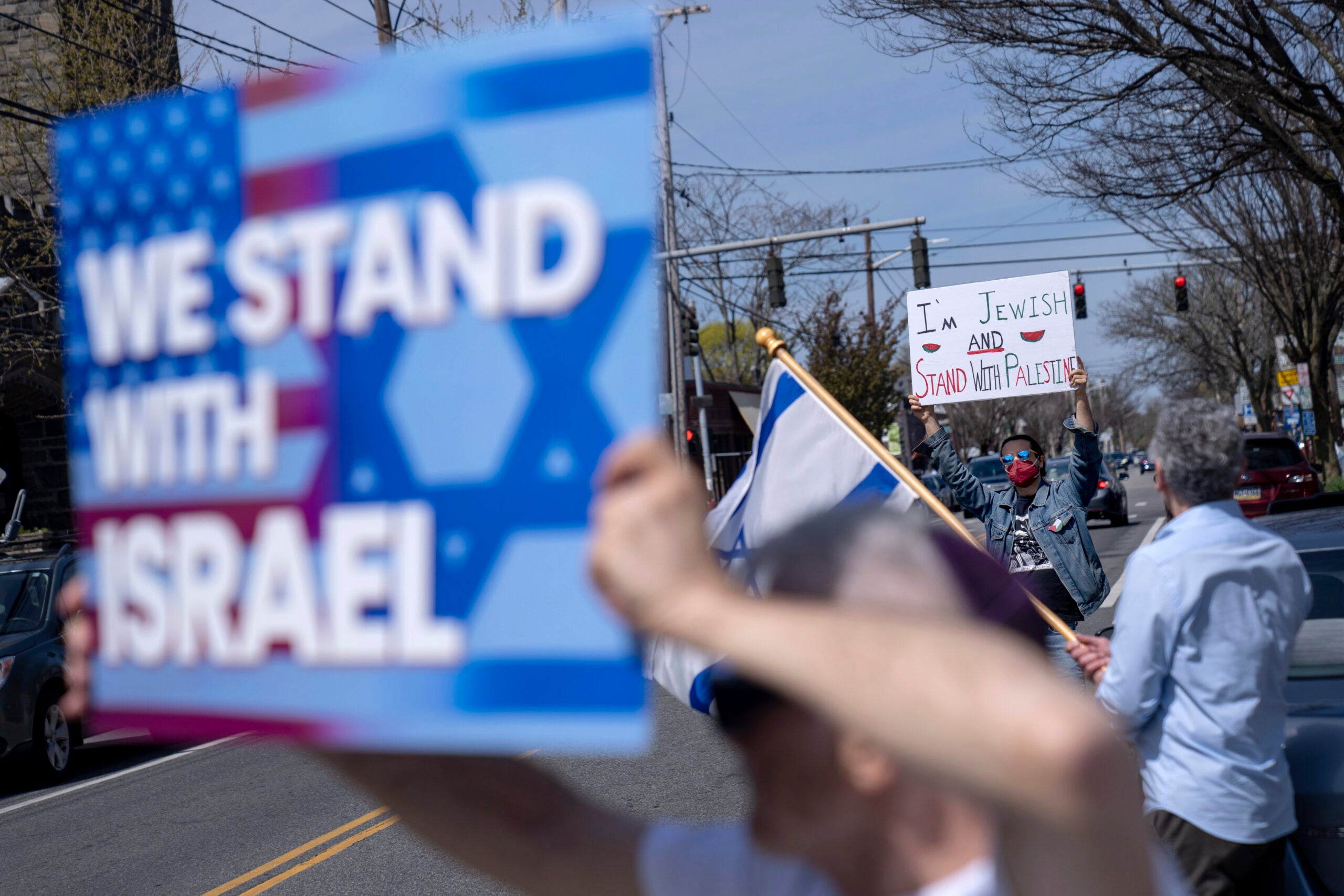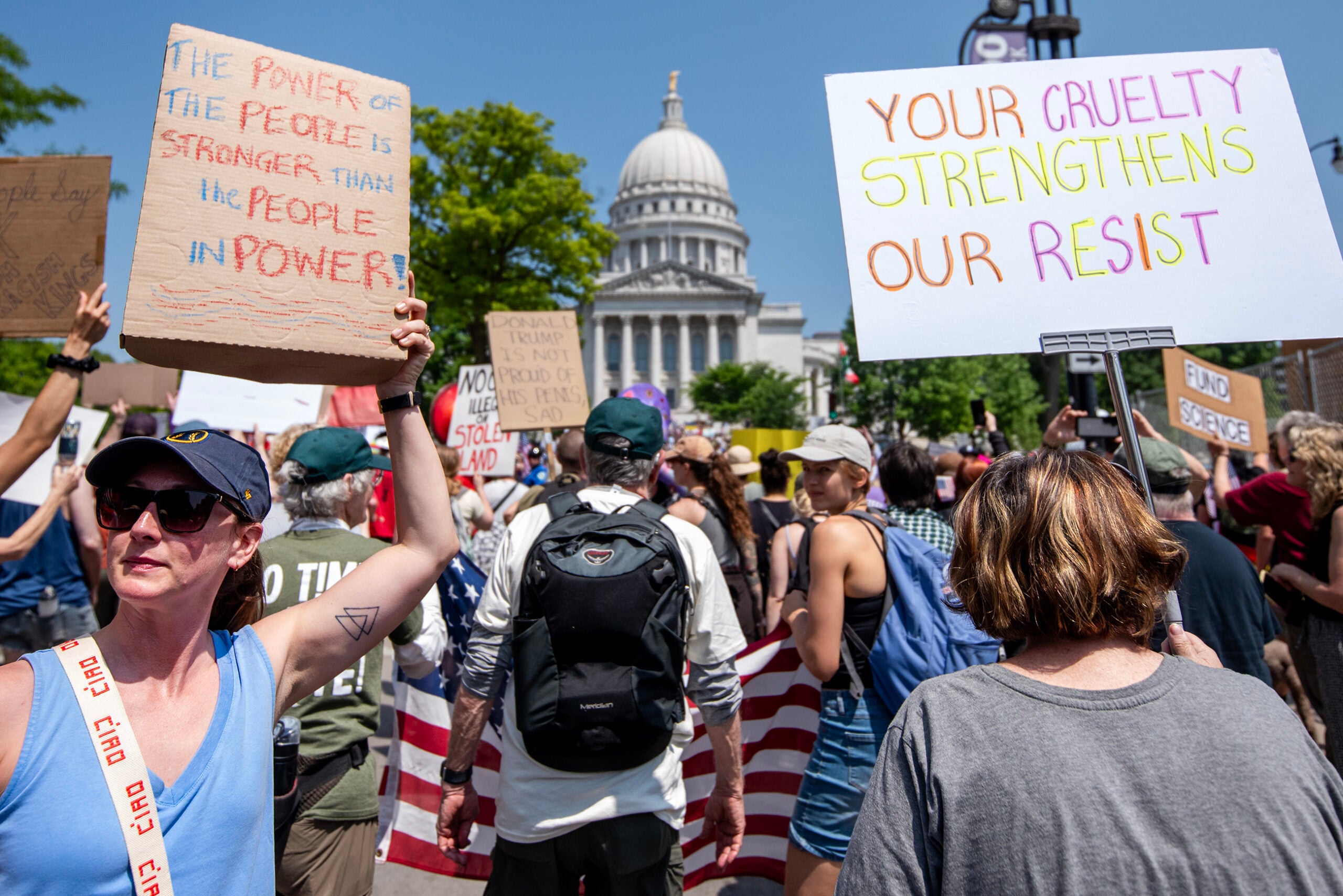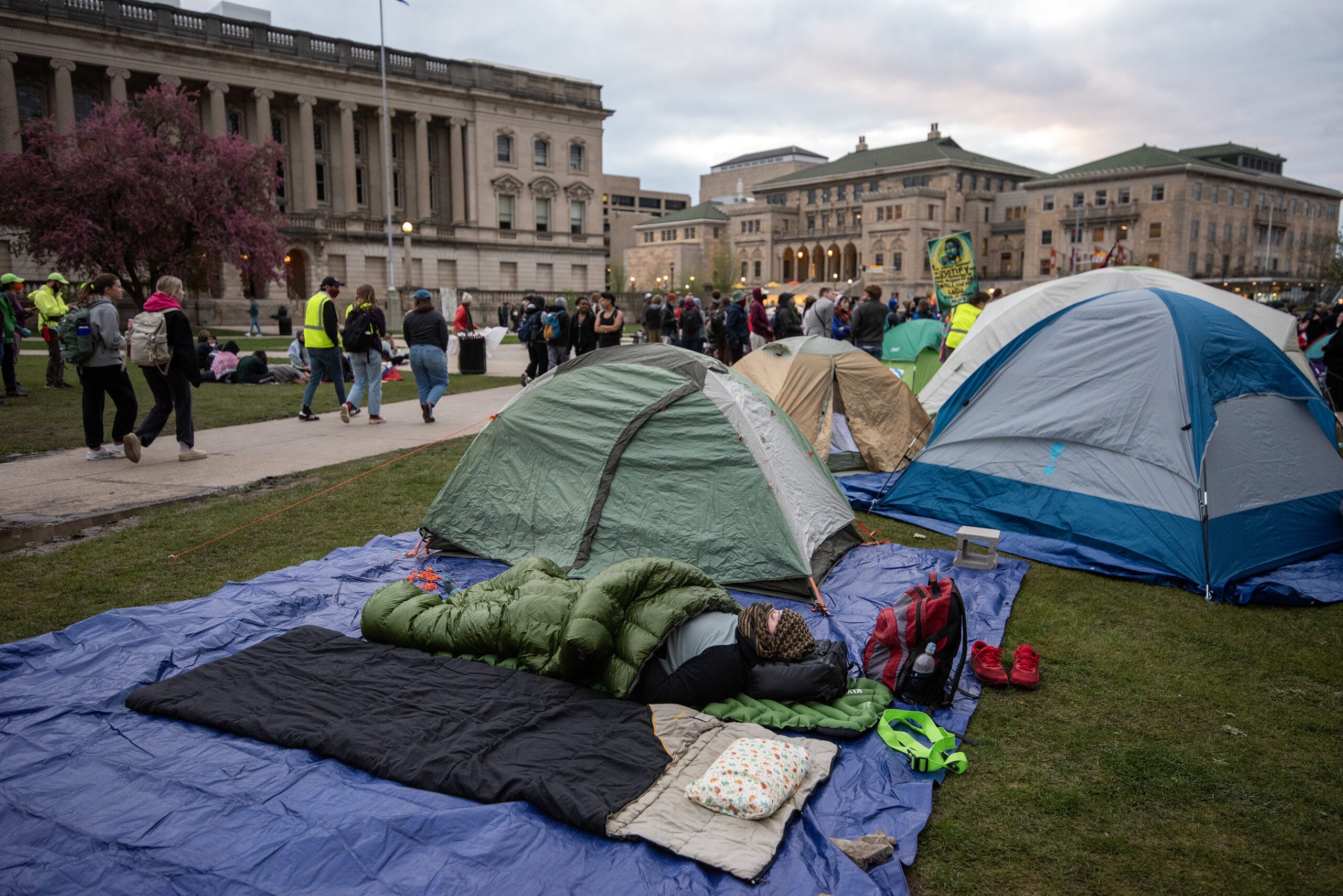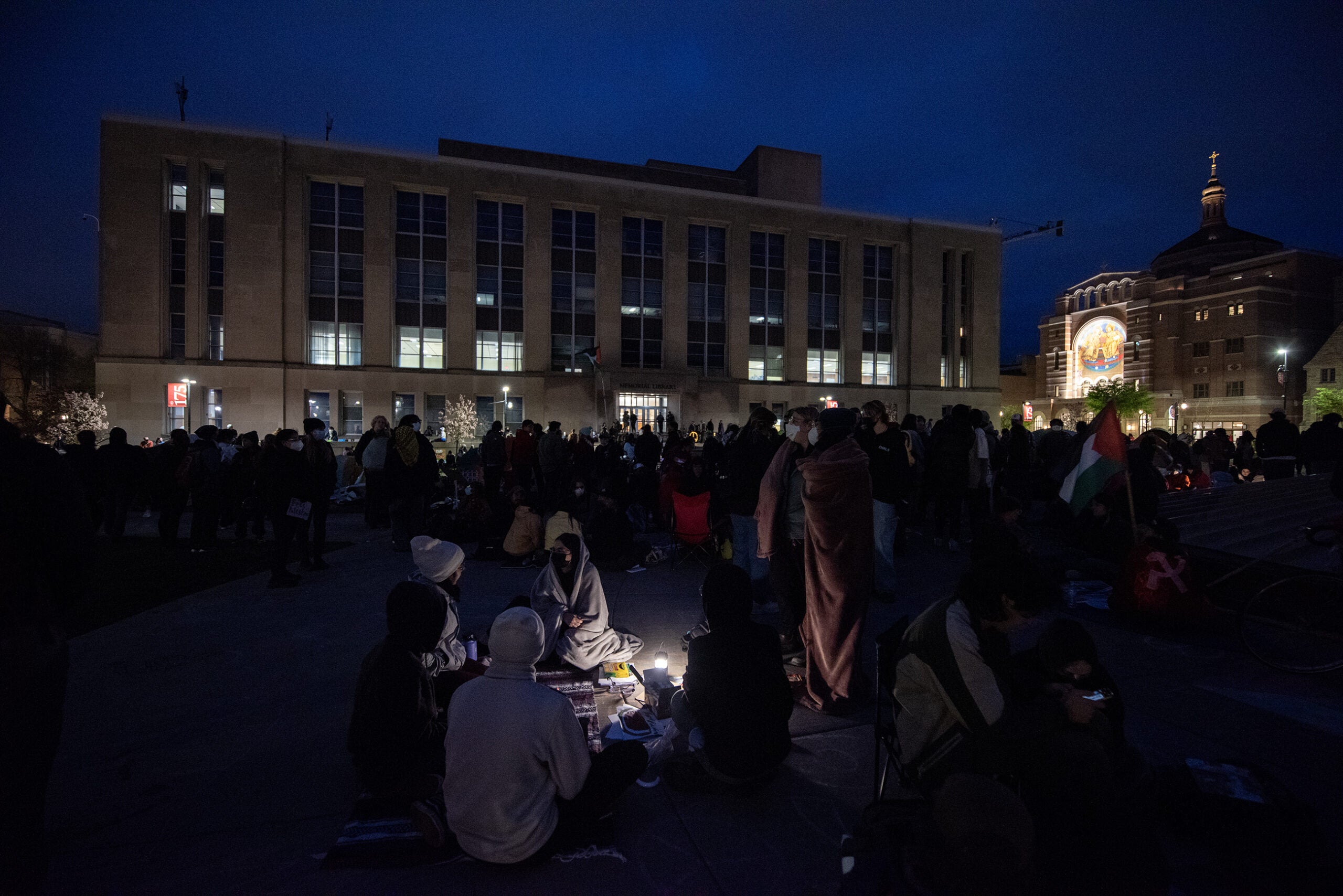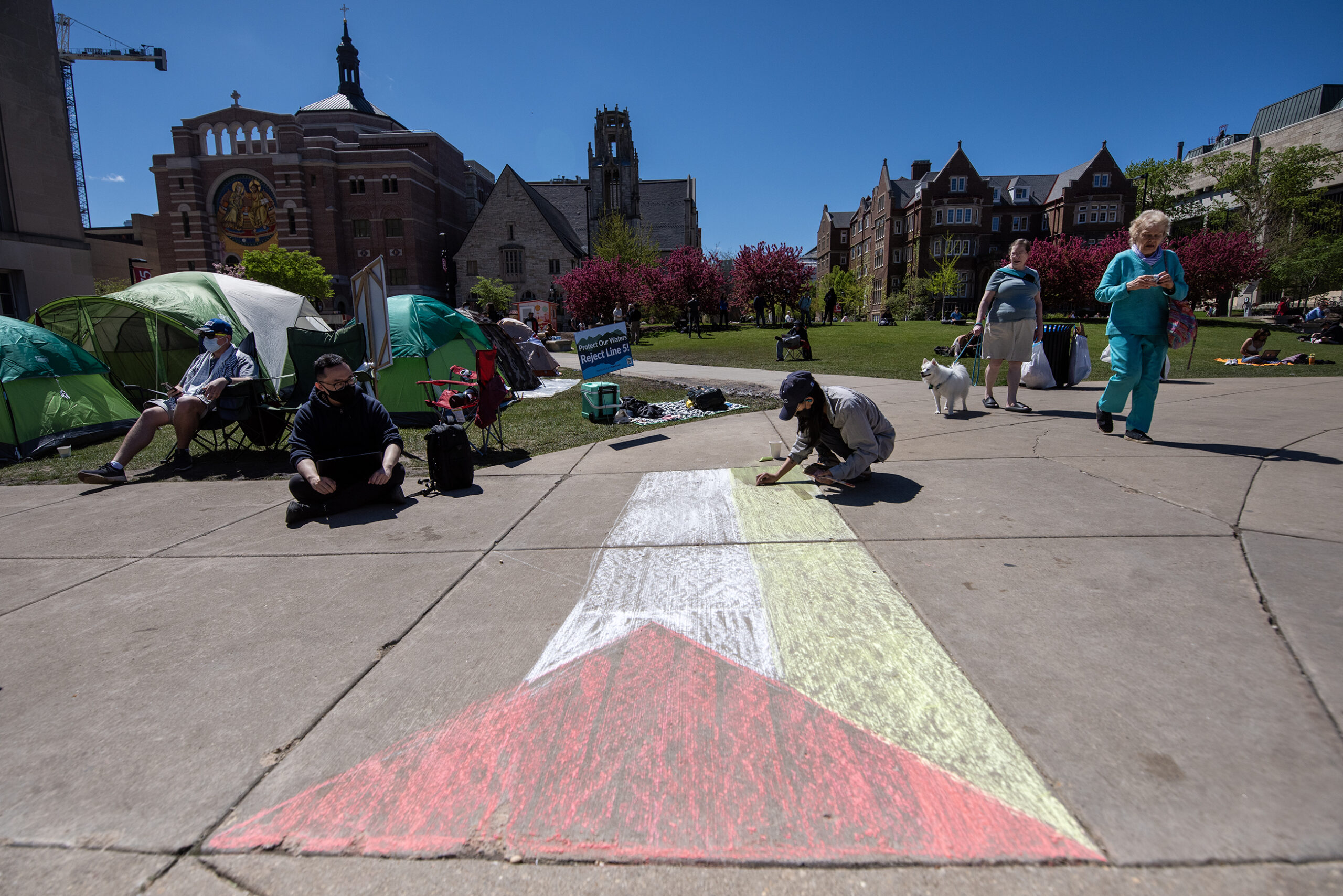This story was produced and originally published by Wisconsin Watch, a nonprofit, nonpartisan newsroom. It was made possible by donors like you.
Miriam Hasan, 39, has had a complicated relationship with her Palestinian identity.
In 1948, a bombing caused her father Noaman Hasan at 2 years old and his family to flee a small West Bank town outside Bethlehem for a refugee camp. Through adversity, he earned a bachelor’s degree in Egypt before attending the American University in Beirut and eventually finding long-term employment in Wisconsin.
News with a little more humanity
WPR’s “Wisconsin Today” newsletter keeps you connected to the state you love without feeling overwhelmed. No paywall. No agenda. No corporate filter.
During his career as a molecular biologist, Hasan’s father experienced discrimination at work. Hasan recalled one story about her father’s co-workers blaming him for a lab accident seemingly for no reason other than his Arab ethnicity. He never spoke Arabic in the house and compartmentalized it all — the dispossession, the experience of leaving home on foot — as part of the Palestinian identity.
“My dad, I think his early experiences in the United States, just like in the workplace, and maybe socially as well, made him think that the best thing for kids was to make sure they blend in as much as possible,” Hasan told Wisconsin Watch.
Now, with the 2024 presidential election less than three months away, Hasan and other Palestinian Americans are done trying to blend in. She’s speaking out about how Wisconsin residents around her and politicians don’t understand what she calls a “genocide” happening to her community in Gaza. She feels more alienated than ever with no major party earning her vote.
Hasan has a cousin in the West Bank who was held prisoner during the second intifada, a period of Palestinian uprising between 2000 and 2005, and currently lives in fear that he could be recaptured. Hasan said Wisconsinites should care about what’s happening in Gaza, especially if U.S. policy creates refugees, like her father, who “sometimes end up here” after the U.S. government “made their homelands basically uninhabitable.”
“There are a lot of people in Wisconsin that have really very far removed connections to people who are really impacted and bearing the brunt of American foreign policy,” Hasan said. “It really should concern us, and it does concern a lot of people.”
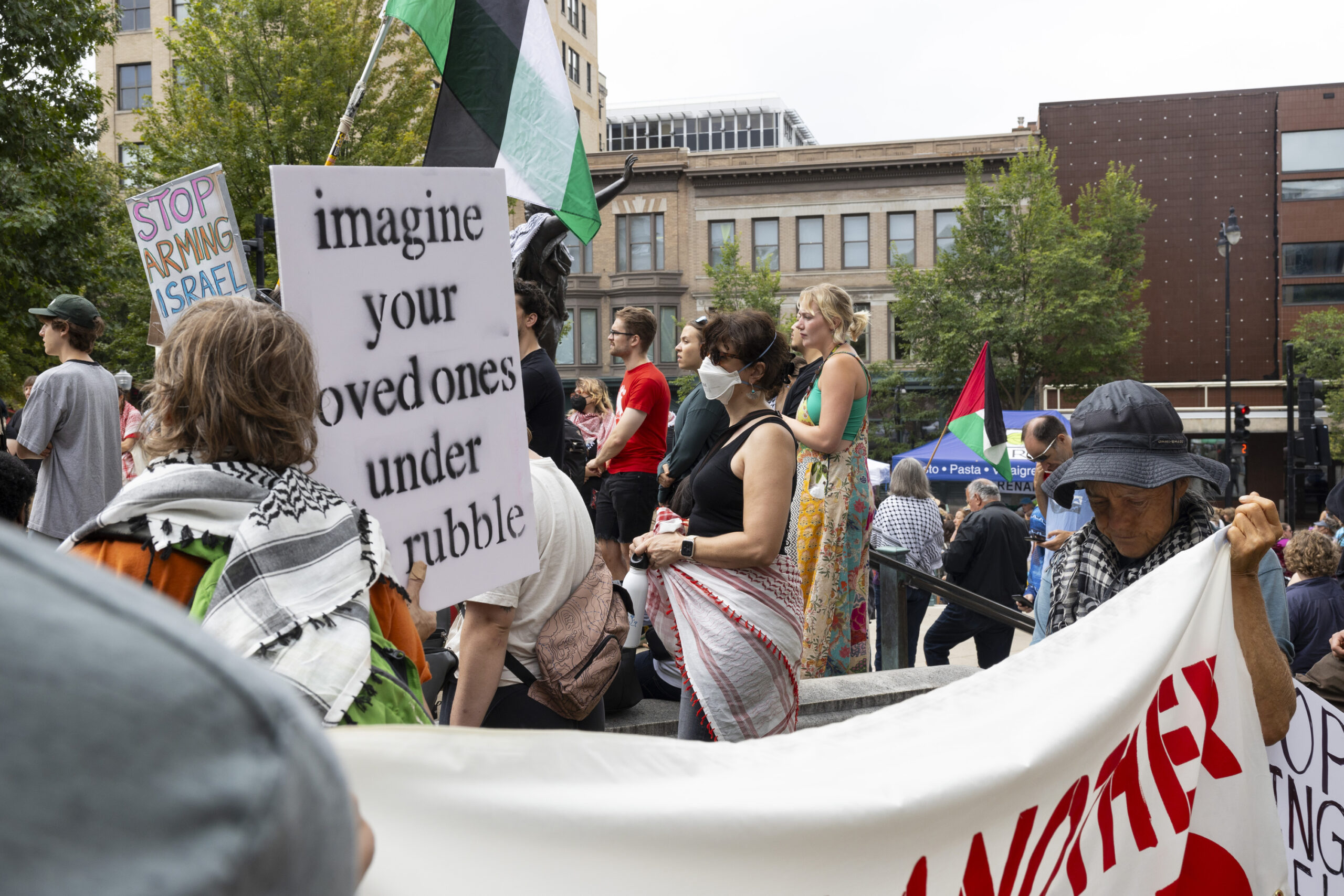
The uninstructed movement builds momentum
In Wisconsin, there are 2,271 Palestinians — roughly 0.04 percent of the state’s population, which is the same percentage of Palestinians in the U.S. population. But they made their presence and ability to politically organize apparent in the April 2 Democratic presidential primary, particularly around college campuses.
About a third of voters in 20 wards on or near the University of Wisconsin-Madison campus chose the uninstructed option rather than President Joe Biden, who has since dropped out of the race and endorsed Vice President Kamala Harris. Uninstructed received 14.6 percent support in Dane County and 8.4 percent statewide, according to a data analysis by The Daily Cardinal.
The high percentage represented a protest against Biden’s policy in Israel, presenting a warning for Democrats, who relied on student turnout to defeat former President Donald Trump by only 20,000 votes in Wisconsin in 2020.
Heba Mohammad, who grew up in Milwaukee, worked for the Democratic Party in 2016 before becoming Biden’s digital organization director in Wisconsin for the 2020 election. She said the Trump presidency represented a time when people rallied and united against him.
But living under the Biden administration became “even worse,” she said, because Trump did what he said he was going to do in Israel, and Biden has not followed through on promises to end the war.
“After 2020, I basically told myself I would not work professionally for the Democrats ever again, particularly because a lot of them have a very anti-Palestine position that they’re proud to say, and they’re proud to spew,” she said. “I think the issue of Palestine highlights so many of the failures of the American government to actually care about vulnerable people.”
Mohammad said Palestinians have told the Democratic Party what it needs to do to earn votes back through the uninstructed effort. She said there needs to be a permanent cease-fire in Gaza, an arms embargo, an end to the siege and reinstatement of humanitarian aid to Gaza.
Hasan echoed Mohammad, saying, “One-hundred percent, I totally agree with those demands,” but “I think those are kind of bare minimum.” Mohammad and Hasan said they would still not vote for Harris even if those goals were achieved because of what Palestinians have faced in Gaza under a Democratic president.
“I could support a Democrat if they showed some leadership on the things that are going to be a little painful and hard for us to adopt as a society, but that are necessary for our survival,” Hasan said. “I guess I feel like that’s the role of a leader — to sometimes take a position that’s maybe the right one, but it’s not popular.”
Hamas — the militant Islamic Resistance Movement, which the U.S. defines as a terrorist organization — launched an attack on Israel Oct. 7, killing more than 1,200 people in Israel and taking 240 hostages. Since then, the Israeli military has killed more than 40,000 Palestinians and severely restricted the entry of food and other vital supplies to Gaza, bringing the territory of more than 2 million people to the verge of famine, according to the United Nations.
But war and displacement aren’t new for Palestinians.

In 1917, the British pledged to create a Jewish national home in Ottoman-controlled Palestine to gain Jewish support in World War I. The British also promised a united Arab state in the Middle East. By 1920, Britain took control of Palestine under the League of Nations Mandate, and over the next few decades, more than 100,000 Jews entered to rebuild their lives after fleeing from oppression and the Holocaust.
After World War II, at least 750,000 Palestinians, from a 1.9 million population, became refugees from expulsion between 1947 and 1949 during the creation of Israel.
Israel occupied 78 percent of Palestine, and the remaining 22 percent was divided into what is now the West Bank and the Gaza Strip, which is a 25-mile coastal stretch. Many people remember that period as the Nakba, or “catastrophe,” as it traumatically uprooted Palestinian families.
Palestinians say US politicians leave them out
Only in college did Hasan begin to understand her Palestinian identity and register what her father went through. She realized that earlier in her life classmates would make anti-Arab 9/11 jokes in front of her, perhaps not realizing her identity due to her pale appearance. Those memories still stick out more than two decades later.
Hasan has never voted for a third party before or skipped a presidential election, but said she plans to cast her ballot for Green Party candidate Jill Stein this November. She has grappled with the question of whether she is throwing her vote away and helping Trump.
“I do not want Trump to be president. I absolutely don’t. But I also think that pushing Kamala Harris to the left to adopt positions that are more in support of peace and preserving our environment, I think that will make her a more viable candidate,” Hasan said. “If she were to come up with an amazing plan for stopping the genocide, cleaning up what’s happening, restoring aid, increasing aid and rebuilding Gaza and actually creating a path to peace that is not contingent on Palestinians not resisting their subjugation, I think that that would be compelling to people and I think she would actually possibly have more popular support.”
A July national poll done by the Arab-American Discrimination Committee shows 45.3 percent of Arab American respondents support Stein, 27.5 percent support Harris, 17.9 percent are undecided, 6 percent are not voting and 2 percent support Trump.
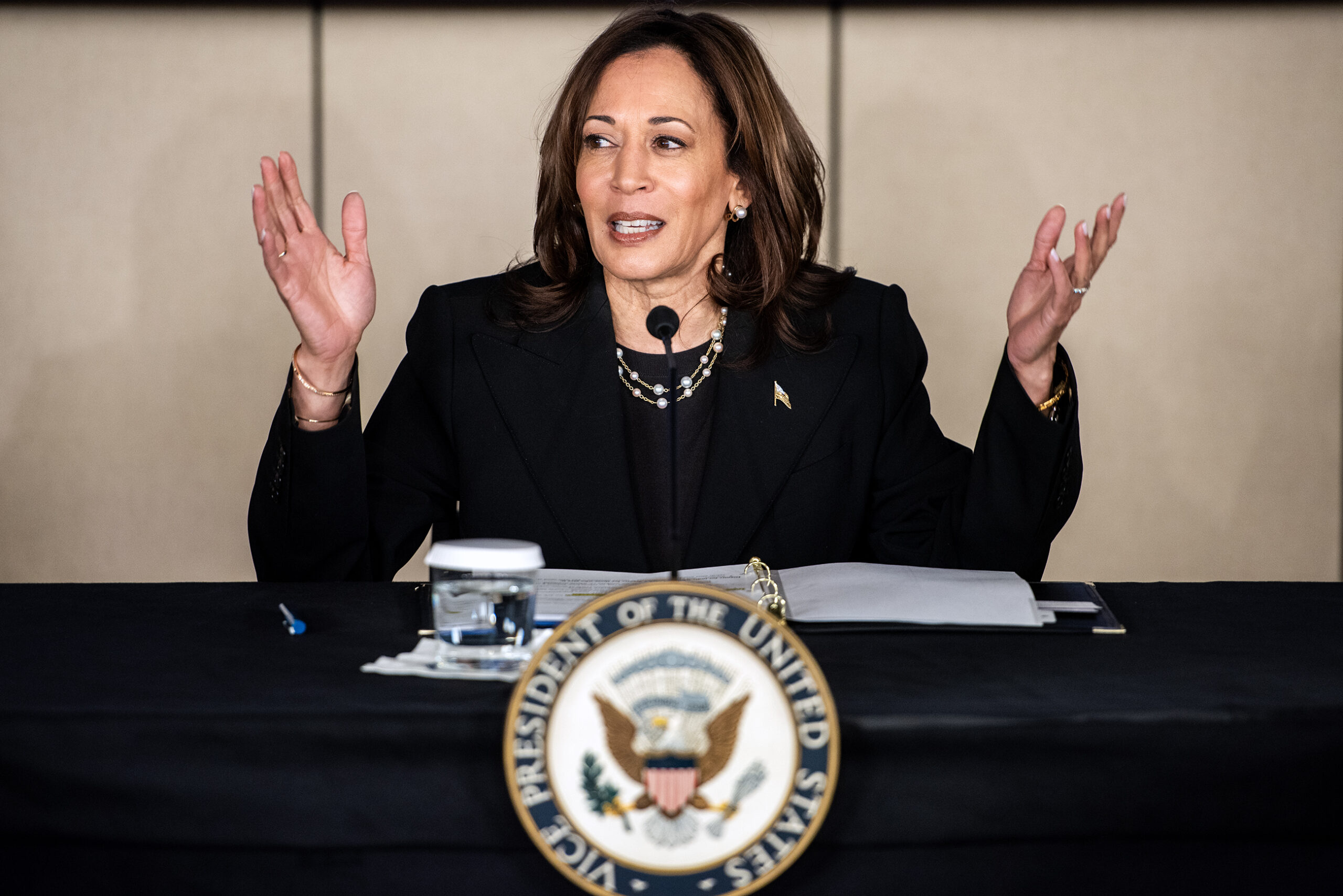
Trump and Harris have different plans to address the war. NBC News reports Harris is pushing for de-escalation, a ceasefire in return for Israeli hostages and a two-state solution — a proposal the United States supported before the Trump administration changed course.
Still, human rights advocates and pro-Palestinian groups have denounced Biden’s continued funding of Israel, including a recent $17 billion in military aid while the country faces accusations before the International Court of Justice it has committed genocide. Surveys show the majority of Americans disapprove of Biden’s handling of the war, though Democrats tend to say he’s sending too much aid and Republicans say it’s not enough.
During this week’s Democratic National Convention in Chicago, more than 150 organizations from around the country organized “family-friendly” protests with estimates of up to 100,000 demonstrators. Chicago is home to the country’s largest Palestinian population. It remains to be seen if those numbers materialize. Organizers expected more than 5,000 protesters to protest at the Republican National Convention in Milwaukee last month, but 700-800 people participated.
Trump has taken a hard pro-Israel approach. He has not said under what conditions Israel should stop its military campaign, but has offered no support for Palestinians.
During his tenure, he moved the U.S. embassy from Tel Aviv to Jerusalem, while touting he has “fought for Israel like no president ever before,” according to Politico.
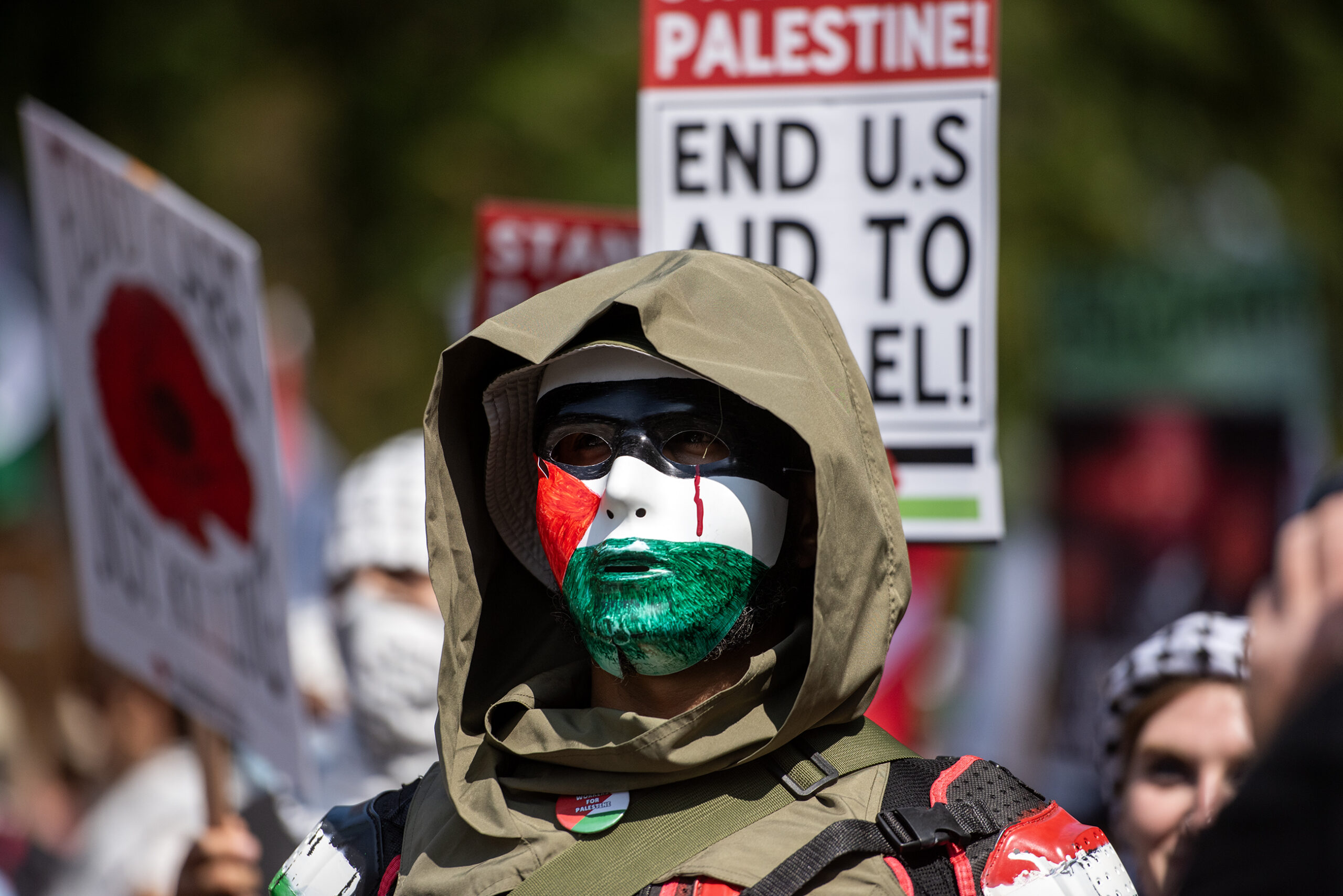
Kareem Mayouf, a 24-year-old Palestinian from Madison, said he’s disturbed that both major parties take donations from pro-Israeli lobbying groups like the American Israel Public Affairs Committee, or AIPAC, a lobbying group that for years has advocated for U.S. support to Israel. In 2017, Harris spoke at the annual AIPAC conference and backed Israel’s right to defend itself and U.S.-Israeli military cooperation. The U.S. gave Israel about $3.3 billion in military aid in 2022 and since World War II has provided more aid to Israel than to any other country.
“Watching this genocide unfold is like another layer of misery on top of the fact that the political system here is so backward and corrupt, it feels like we don’t really have any stable options because the same financiers support both political parties, so it feels like our voices aren’t really reflected at all in any sort of meaningful political way,” Mayouf said.
UW-Madison student Reem Itani, 20, who was involved in the uninstructed movement in the April Democratic presidential primary, told Wisconsin Watch she felt “very unsafe” living under a Trump presidency, pointing to his administration’s 2017 travel ban from seven predominantly Muslim countries, which Trump called a “Muslim ban.”
But Biden and Harris have continued to support Israel despite large-scale Israeli offensives that have killed civilians, seemingly in violation of the administration’s own red-line policy warning against such attacks. That support has pulled her away from the Democratic Party, she said.
Itani said a few of her friends told her she is “privileged” not to vote for Harris. She said that feels out of touch and uncompassionate.
“I hate Trump as much as the next person, but I also hate the fact that people gaslight us into voting for someone who is actively funding the genocide of our own people, and they act like we’re the worst person in the world, for not voting for that person, which is pretty crazy to me,” Itani said.
Mohammad is also upset with Wisconsin politicians such as U.S. Sen. Tammy Baldwin, who she said “repeatedly ignores” the Palestinian issue. Mohammad said she asked Lt. Gov. Sara Rodriguez about her position on the war, but Rodriguez’s staffer rebutted by asking whether Mohammad had ever “been to Palestine.”
Rodriguez did not respond to repeated requests for comment.
Baldwin’s website includes a section of her “taking action to respond to the emergency in Israel and Gaza.” It mentions urging Biden to establish a framework for the U.S. to recognize a non-militarized Palestinian state, a cease-fire agreement contingent on Hamas releasing Israeli hostages and a joint push from 24 other Senate colleagues to encourage Biden to take “five specific steps to significantly increase urgent humanitarian aid for civilians in Gaza.”
In March, Baldwin said at a roundtable event “we certainly need an immediate cease-fire,” and “it has to be agreed upon by Israel and Hamas.” In December, she called for a “humanitarian cease-fire.”
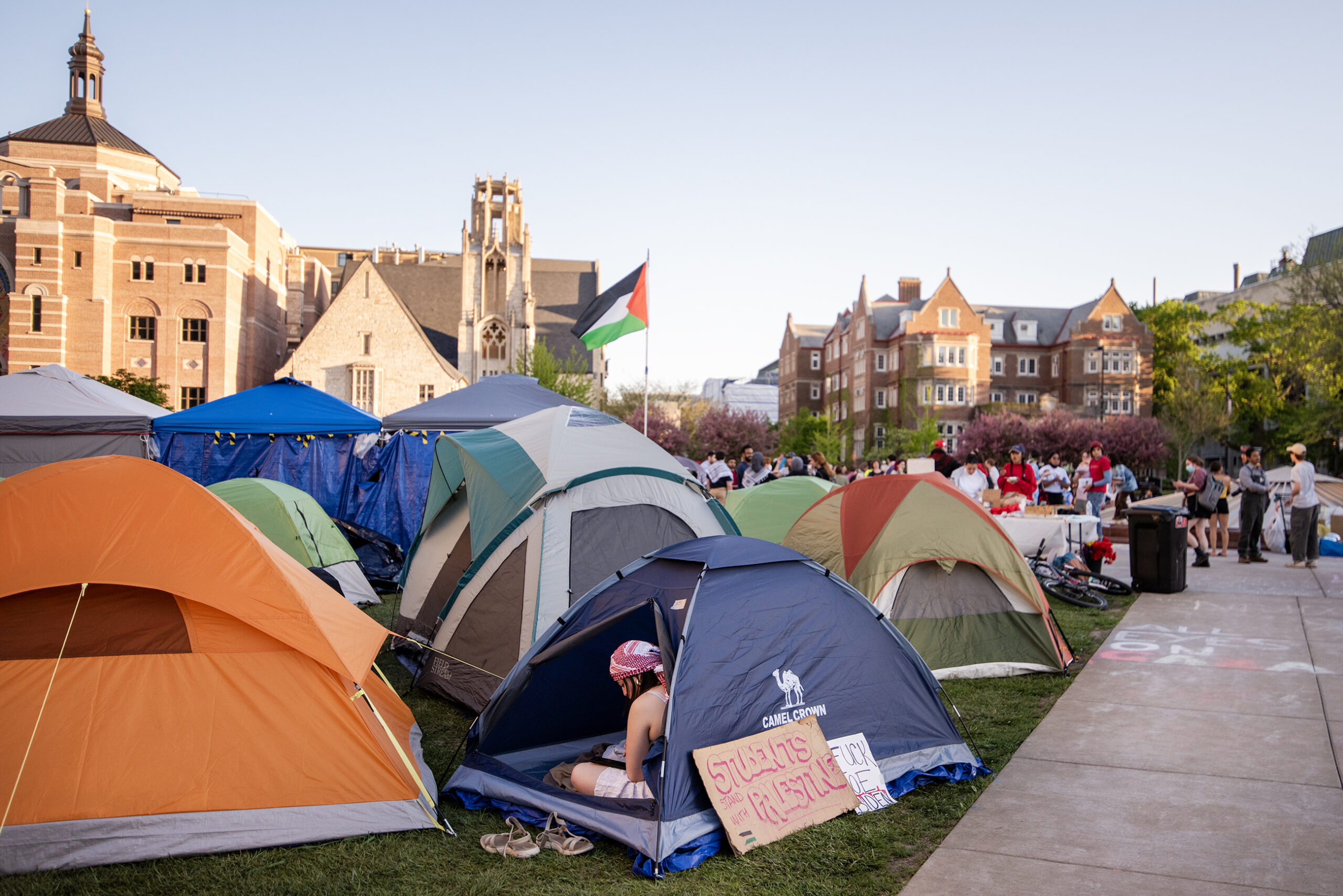
Itani said she doesn’t support Baldwin because “she took a very long time to call for a cease-fire and supported funding for Israel for a very long time and she hasn’t completely addressed her actions.”
In April, Baldwin helped pass the foreign aid package that sent about $17 billion to aid Israel.
“She could be pressuring Joe Biden and Kamala Harris right now for an arms embargo if they don’t think that would pass Congress,” Mohammad said. “She’s choosing not to.”
Mohammad also said in October she submitted multiple requests to have a constituent meeting with Baldwin’s office, then called “daily through November,” only speaking with an intern who answered the phone.
“I wish people acknowledged that we deserve just as much understanding and respect as everyone else,” Itani said. “I think a lot of people in rural areas have never met a Palestinian before, so they just think we’re terrorists and want the worst.”
Baldwin’s team told Wisconsin Watch Baldwin sent Mohammad “four letters detailing her position.”
“As I have said for months, this war must end. We must reach a ceasefire immediately to bring the hostages home, provide desperately needed aid to Gaza, and work toward a lasting peace in the region,” Baldwin said in an email statement to Wisconsin Watch.
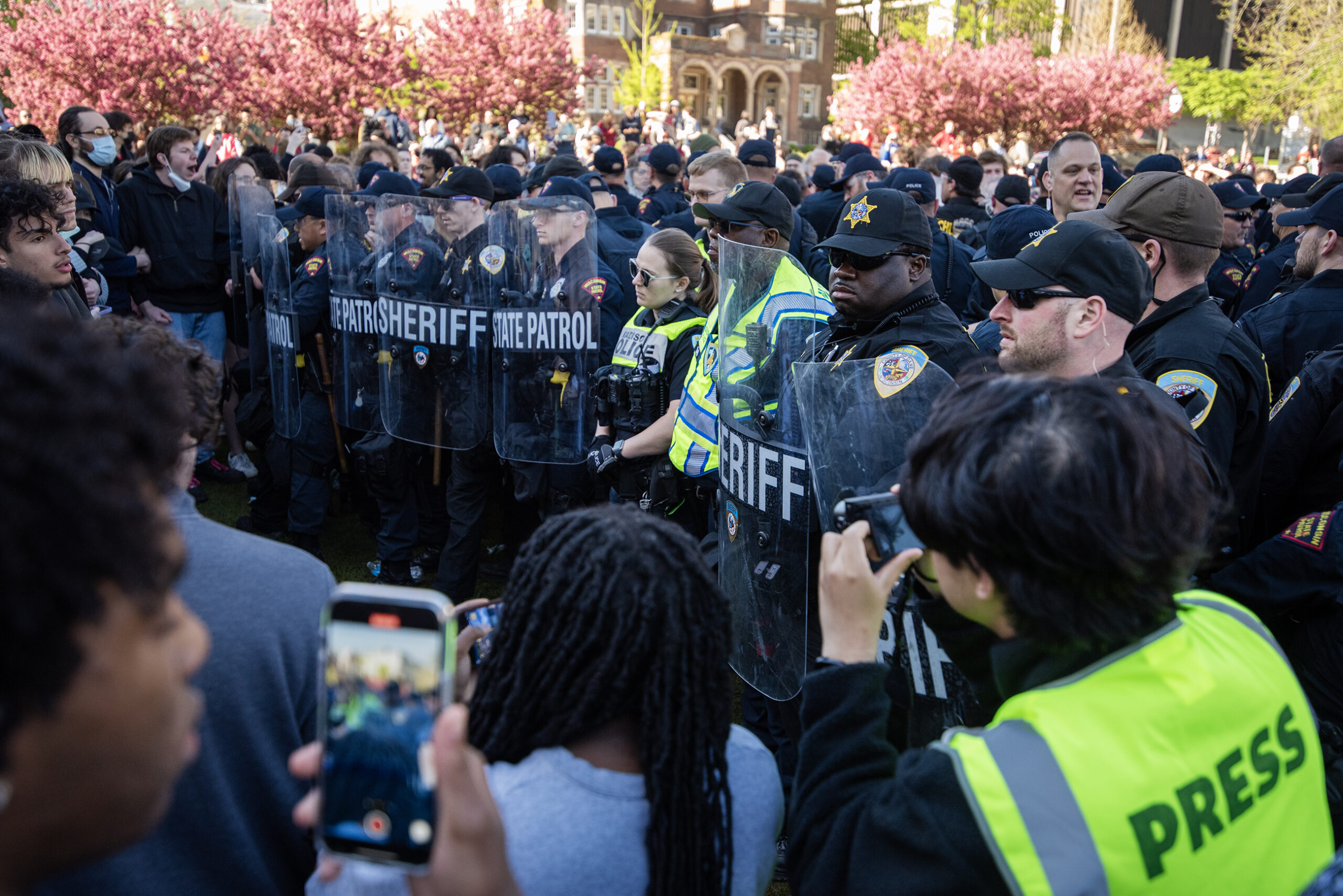
Palestinians seek understanding
Ultimately, it did not matter when Biden dropped out of the race for Hasan, Mohammad, Mayouf or Itani. Mohammad worries people have provided a “clean slate” for Harris, who is “just as guilty as Joe Biden” for funding the Israeli military.
Instead of working with the Democratic Party, Mohammad works on educational events, marches and cultural nights in Milwaukee to keep Palestinian resistance alive.
A few thousand people flocked to the DNC march Monday, the Associated Press reported. A rally was held in the early afternoon, followed by a mile-long march with a myriad of signs, chants and outfits from people across the country.
Hasan and Mohammad, who could not make it to the RNC protest, plan to participate in additional DNC protests later this week. Mohammad, who attended Monday’s march, said “seeing thousands of people unite around a message for a free Palestine” was “amazing.”
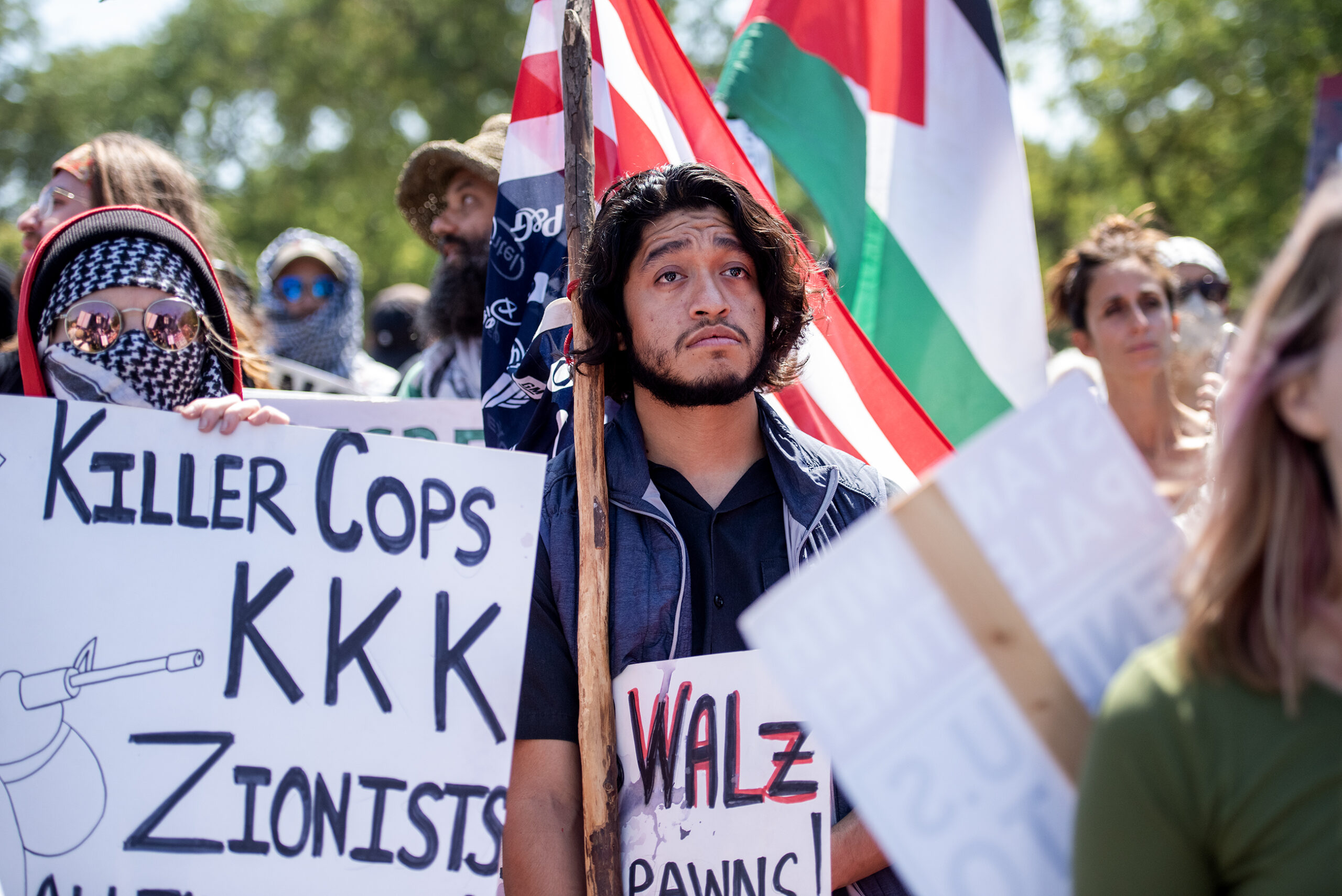
Hasan plans to march Thursday. Mayouf, who could not make it to the RNC or DNC march, said the DNC protest will signal to the Democratic Party that “stopping the genocide” is key to winning a razor-thin election.
“There’s a long running joke within the Palestinian community that we’re never gonna let you forget that we’re Palestinian because we could be having the most mundane conversation, and somehow, we will be bringing it back to Palestine, because our whole lives people have tried to devalue and delegitimize our identity,” Mohammad said.
While the U.S. election is less than three months away and Israel’s war persists, Hasan continues to communicate via text with her cousin in the West Bank. He appreciates updates on the U.S. protests against the war, but they mostly communicate about his new daughter.
“My cousin just had a baby in January, so he shares lots of baby pictures, which is wonderful,” Hasan said. “Her name is Aryam. She’s just a clear eyed, beautiful, darling child with dark hair and just bright eyes.”
The nonprofit Wisconsin Watch (www.WisconsinWatch.org) collaborates with WPR, PBS Wisconsin, other news media and the University of Wisconsin-Madison School of Journalism and Mass Communication. All works created, published, posted or disseminated by Wisconsin Watch do not necessarily reflect the views or opinions of UW-Madison or any of its affiliates.



